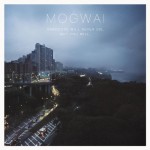Mogwai, Hardcore Will Never Die, But You Will

It’s been 14 years since Young Team was released, announcing the debut of post-rock’s then-newest practitioners, Mogwai. Since 1997, the genre has garnered quite a bit of attention in the film and television industry, with various post-rock bands scoring the soundtracks to The Fountain, Friday Night Lights, and Human Planet. Along with critical acclaim for songs like “2 Rights Make 1 Wrong” and “Christmas Steps” and tours with ’80s/’90s icons The Cure and Pixies, you’d expect Mogwai to receive the same publicity as post-rock brothers Sigur Rós or Explosions in the Sky.
For whatever reason, though, that simply isn’t the case, as the Scottish quintet has yet to fully break into the mainstream. However, this lack of public acknowledgement has yet to deter Mogwai, as they’ve just released their seventh full-length album, Hardcore Will Never Die, But You Will.
Like all post-rock bands, Mogwai has never been good with words, and there is a strange humor to be found in song titles like “How To Be A Werewolf” and “Too Raging to Cheer.” With six previous albums, the band has little to offer in terms of how to revolutionize a well-defined genre, and Hardcore Will Never Die is no different. Mogwai have instead loosened up, as Hardcore Will Never Die lacks the seriousness of previous albums.
Outside of “You’re Lionel Ritchie,” Mogwai’s signature style of oscillating between quiet, brooding tones and full on white noise is traded in for more traditional structures. First track “White Noise” encapsulates this newfound outlook, with the very Mogwai-like use of heavy effects and background distortion used to accompany cleaner keyboard melodies. The same kind of stripped-down mentality is seen in “How to Be A Werewolf,” which is filled with traditional pop sensibilities yet still retains a very Mogwai-esque sound.
At times, this change betrays them, as songs like “San Pedro” and “George Square Thatcher Death Party” sound less like post-rock and more like the instrumental cuts for any generic alternative rock band. The aforementioned songs highlight the difficulty of post-rock and Hardcore as a whole: you cannot simply remove vocals; you must fill that crucial void. Too many times, Hardcore Will Never Die fails to deliver an experience that can stand on its own, completely independent of vocals.
Throughout the album, you’re left wanting more, and in the end, Hardcore Will Never Die is slightly uncomfortable, inevitably leaving you to ask, “Is this it?”



[…] can also read a review of the album at Space City […]
[…] Yuan, & on David Cobb‘s excellent Houston Calling site — check ‘em out here and […]
I respectfully disagree. I’ve been a Mogwai fan since their first album and I think this new CD ranks among their best work. I’ve listened to it at least 10 times and it never fails to seize my attention and carry me into a happy place.
Blaming Mogwai for not having vocals is like blaming an opera for being in Italian. It just comes with the territory.
Steven, thanks for your thoughts! Maybe I wasn’t clear on what I was trying to say, it’s not so much that Mogwai needs vocals (post-rock by nature rarely uses vocals) it’s that the album felt too simplistic and lacked the sort of creativity that elevates post rock beyond generic background tracks. While vocals obviously isn’t the answer, I really felt the album needed something more (maybe additional guitar layers/synth/just something). Some feel that this isn’t simplicity but a more focused attention on music, but it didn’t feel that way to me. Then again, this is just my opinion and I’m glad there are plenty of Mogwai fans out there who disagree with me as they are a good band, this album just didn’t do it for me. Thanks again and please keep reading!
For some reason I just found out about Mogwai from a Rolling Stone review last month. The article above nailed it 100%! I downloaded the new album and was mad because I thought I downloaded the instrumental of an album. I can absolutely appreciate a good instrumental record, but these tracks cannot stand by themselves. It sounds like the words were just taken out. Like this author said… you have to fill that crucial void. This album clearly does not to that.